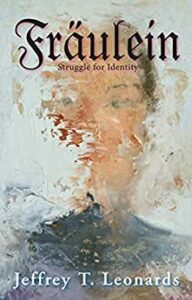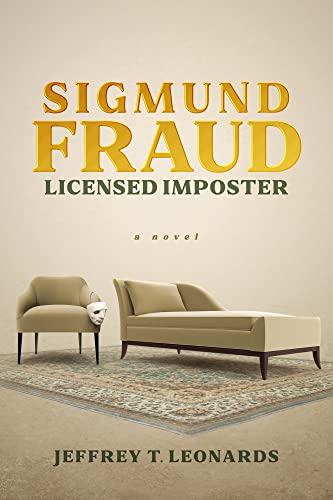
Sigmund Fraud, Licensed Imposter received a 4+ star review, making it an IndieReader Approved title.
Following find an interview with author Jeffrey T. Leonards.
What is the name of your book?
Sigmund Fraud, Licensed Imposter
What’s the book’s first line?
“It was a hot sticky morning in rush hour traffic when I had a flash of insight that would set the stage for one of the most important decisions of my life.”
What’s the book about? Give us the “pitch”.
Doctor Braydon Mitchell is a middle-aged psychologist whose life is awash in challenges. While each working day is spent assisting patients with their problems, his own marriage is crumbling under the weight of unresolved loss and personal tragedy. Added to his woes are changes in the health care industry that threaten his very livelihood.
The doctor’s struggle to cope triggers self-defeating behaviors, not the least of which being an ill-advised office romance. It all culminates in a downward spiral that puts the clinician on a collision course with everything he’s ever fought to achieve.
Eventually, Doctor Mitchell realizes that he, the vaunted professional, is no less flawed than any patient who’s ever paid for his counsel. He sees himself as an imposter, someone who’s been hiding behind a mask woven from the same tawdry parchment of the fading diplomas dotting his wall.
His survival hangs on a decision. To be anything other than Sigmund Fraud—a self-deprecation that followed him like a rank-smelling dog pocked in mange—Doctor Mitchell will have to confront the biggest therapeutic challenge of his life. Himself.
What inspired you to write the book? A particular person? An event?
Having spent thirty-seven years in clinical practice, I’ve often been struck by how often patients look at doctors as if they are somehow immune to the common frailties that patients bring to the clinic. The truth may be that lurking beneath an esteemed clinician’s veneer can be the hypocrisy of “do as I say, not as I do.” I remember a movie from years back entitled, The Doctor. It was about a highly successful surgeon who had the world by the tail and gloried in his deification. He treated his patients and staff with condescension and superficial friendliness. His entitlement persisted until he himself was diagnosed with cancer, at which point he was subjected to the same indignities, the same short shrift, as the hundreds of patients he had treated. He emerged from his ordeal a changed man. My book was aimed at showing people as they really are: doctors, patients, lawyers, and truck drivers. As they say, we all pull our pants on one leg at a time.
What’s the main reason someone should really read this book?
As I tweaked the story, I did some beta runs with friends, clinicians, and former patients. The consensus was that there was something for everyone in the story. The struggles of the protagonist reflect a strongly humanistic element that most people can relate to. I also would like to think that some who are struggling with life changes, yet have not found it within themselves to seek help (maybe for fear of being considered weak or inadequate) will find motivation from the choices made by the main character.
What’s the most distinctive thing about the main character? Who-real or fictional-would you say the character reminds you of?
Brandon Mitchell, the main character, is brought down a peg by a host of stressors that challenge his coping skills. I would also submit that one cannot write fiction without some elements of autobiography leaking through. Without question, I too have had both personal and professional experiences that find voice in the narrative. The protagonist struggles, for sure, as do we all. I think Brandon personifies, directly or indirectly, what many of us, both men and women, have encountered and/or endured in everyday life.
When did you first decide to become an author?
I began writing for fun in grade school. I still have a few imaginative essays going back to the eighth grade, which to this day I enjoy reading. I published my first professional articles in graduate school and continued writing technical pieces throughout my career. My writing really took off with the advent of word processors. All of a sudden, instead of scratching out lines on the written page and filling large wastebaskets with discarded revisions, I was able to modify my work seamlessly and effortlessly. It was love at first sight. I’ve never looked back. In my retirement, fiction is proving most enjoyable, and I lament not having had the time to do this earlier in life.

No. My first novel came out in February of 2021. It was entitled, Fraulein: Struggle for Identity. It involved an enormity of research into very painful material. It was a very poignant, very sobering story of a young female physician running afoul of the Nazis and being traumatized by her true-to-life experiences in concentration camps. The novel chronicles her life-long struggles with post-traumatic stress disorder. It took almost five years to write. I’m pleased with how it turned out.
What do you do for work when you’re not writing?
I am happily retired, though I must admit to being every bit as busy in my retirement as when I was working full-time. I also am an endurance athlete. I bike 4500 miles per year, play ice hockey year-round, and Nordic ski throughout the winter.
How much time do you generally spend on your writing?
I can easily spend at least five or more hours per day writing.
What’s the best and the hardest part of being an indie?
The most difficult part for me, and I dare say for the majority of writers, is marketing my work. I have never had writer’s block, thank goodness, but promoting my work is something I wish someone else could do. The truth is, I do not write to make money. I write strictly for both pleasure and the challenge of seeing if I can create a story that works. I can spend an entire week revising just a few paragraphs, just to make sure I am saying what I want. Each time I finish it, it sounds great… until the next day, at which point I am inclined to rewrite it yet again. I believe it was Hemingway who said that he rewrote a final chapter something like 57 times before he was satisfied. I can relate to that.
What’s a great piece of advice that you can share with fellow indie authors?
Pushkin once said, “Write for pleasure; publish for money.” I encourage the former.
Is there something in particular that motivates you (fame? fortune?)
I always remind myself that when I first began writing Fraulein (my first novel), I felt that if only two people were ever to read my work, I’d be satisfied. I have enough self-awareness to know that I will never be a best-selling author, but I’m totally happy with who I am, especially because, well, it turns out that more than two people have read my work. To see in black and white all the encouraging reviews is as humbling as it is motivating.
Which writer, living or dead, do you most admire?
There are way too many authors to narrow things down to one. Let me suggest but a few: J.D. Salinger, Don Winslow, Philip Roth, John Grisham, Ken Follett, Cormac McCarthy, Mario Puzo, and James Michener. In my earlier years, when I was highly influenced by existential philosophy, I would have included the likes of Camus and Dostoyevsky.
Which book do you wish you could have written?
Don Winslow’s The Force. I couldn’t put that book down.
